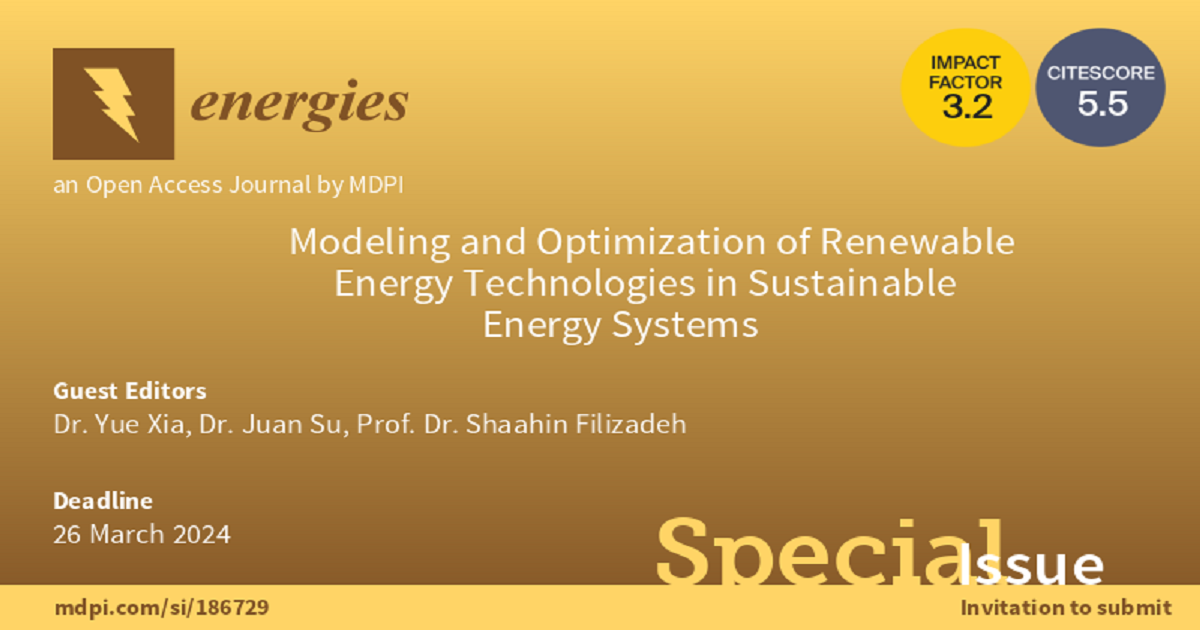Modeling and Optimization of Renewable Energy Technologies in Sustainable Energy Systems
A special issue of Energies (ISSN 1996-1073). This special issue belongs to the section "A: Sustainable Energy".
Deadline for manuscript submissions: closed (26 March 2024) | Viewed by 4562

Special Issue Editors
Interests: power electronic systems; electrical machines; wind power; power system transients modeling; reinforcement learning
Interests: power demand-side management; energy systems control and operation; power market
Special Issue Information
Dear Colleagues,
In order to reduce carbon emissions, power system rely heavily on increasing amounts of renewable energy resources and energy storages. Renewable energy resources have significantly changed the operation and control practices. Modeling and optimization of renewable energy technologies play an important role in achieving their optimal operation and integration within sustainable energy systems. By accurately representing the complex behavior and interactions of various components (e.g., renewable energy resources, energy storage systems, power grid, and loads) researchers and practicing engineers can better understand the performance, operation, and control of sustainable energy systems.
The aim of this Special Issue is to investigate the modeling and optimization of renewable energy technologies in sustainable energy systems. We invite researchers and experts from academia and industry to contribute their original research work, innovative methodologies, and case studies in this field to this special issue.
Topics of interest for publication include, but are not limited to:
- Modeling and simulation of sustainable energy systems including real-time models;
- Energy storage technologies and control of sustainable energy systems;
- Demand response and management strategies for sustainable energy systems;
- Sustainable energy systems control and operation;
- Photovoltaic power and wind power generation forecasting.
Dr. Yue Xia
Dr. Juan Su
Prof. Dr. Shaahin Filizadeh
Guest Editors
Manuscript Submission Information
Manuscripts should be submitted online at www.mdpi.com by registering and logging in to this website. Once you are registered, click here to go to the submission form. Manuscripts can be submitted until the deadline. All submissions that pass pre-check are peer-reviewed. Accepted papers will be published continuously in the journal (as soon as accepted) and will be listed together on the special issue website. Research articles, review articles as well as short communications are invited. For planned papers, a title and short abstract (about 250 words) can be sent to the Editorial Office for assessment.
Submitted manuscripts should not have been published previously, nor be under consideration for publication elsewhere (except conference proceedings papers). All manuscripts are thoroughly refereed through a single-blind peer-review process. A guide for authors and other relevant information for submission of manuscripts is available on the Instructions for Authors page. Energies is an international peer-reviewed open access semimonthly journal published by MDPI.
Please visit the Instructions for Authors page before submitting a manuscript. The Article Processing Charge (APC) for publication in this open access journal is 2600 CHF (Swiss Francs). Submitted papers should be well formatted and use good English. Authors may use MDPI's English editing service prior to publication or during author revisions.
Keywords
- renewable energy
- sustainable energy systems
- energy storage
- modeling and simulation
Benefits of Publishing in a Special Issue
- Ease of navigation: Grouping papers by topic helps scholars navigate broad scope journals more efficiently.
- Greater discoverability: Special Issues support the reach and impact of scientific research. Articles in Special Issues are more discoverable and cited more frequently.
- Expansion of research network: Special Issues facilitate connections among authors, fostering scientific collaborations.
- External promotion: Articles in Special Issues are often promoted through the journal's social media, increasing their visibility.
- Reprint: MDPI Books provides the opportunity to republish successful Special Issues in book format, both online and in print.
Further information on MDPI's Special Issue policies can be found here.







